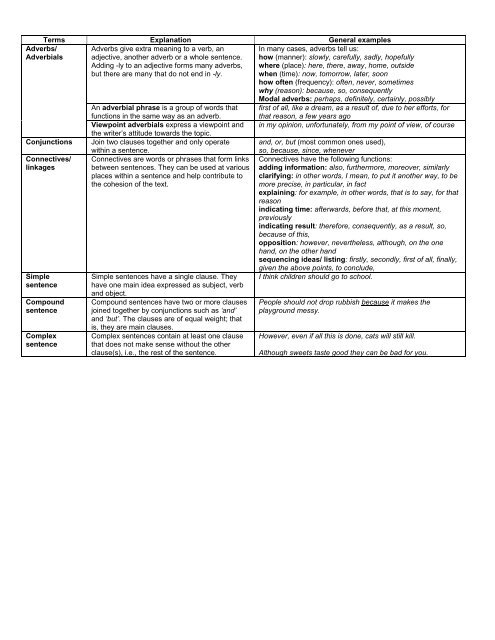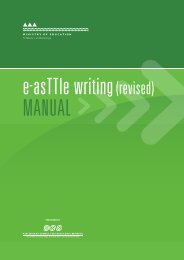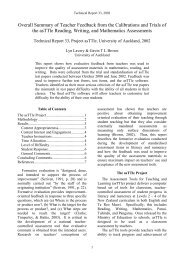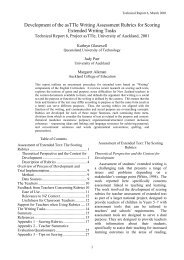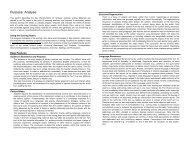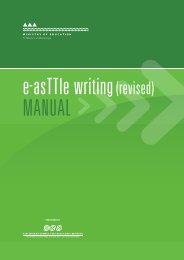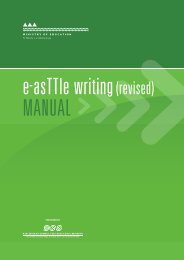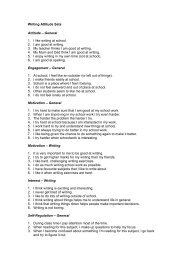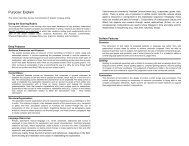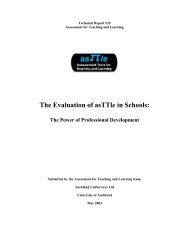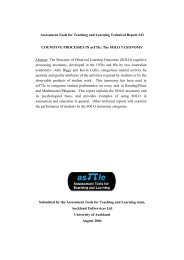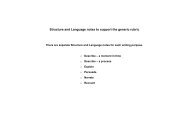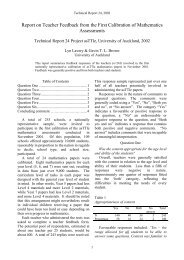Selected glossary of terms for the ‘to persuade’ purpose<strong>Purpose</strong>:- to argue a position or to persuade a reader to a particular viewpoint and- make a reader believe or accept the writer’s position on a topic.Terms Explanation General examplesNoun A noun answers the question: who or what? Some types of nouns are:Abstract: hope, love, joy, beautyCollective: class, team, swarm, schoolCommon: apple, dog, hat, boyProper: Monday, New Zealand, Easter, Board of TrusteesNeutral nouns Nouns that are not gender orientated, i.e., people, children, friendsneither masculine nor feminine.Point of view Words selected to represent the world in a bureaucrat, crime, victim, problem, hero, home invasionnounsPronounsAdjectives/AdjectivalsVerbscertain way and to present a point of view.Pronouns are used often, but not always, to‘replace’ a noun or noun phrase and help thewriter to avoid repetition. They can be confusingto a reader if the pronoun references are notclearly made.Adjectives are words that describe somebody orsomething. They build upInformation around the noun. They answer thequestion which, whose, how many, what like orwhat type?Opinion adjectives give the writer’s evaluationof the thing in question and can be formed byadding a suffix to a noun or a verb, e.g., ful, y,ed, ish, ous or ing.An adjectival is a group of words that are usedto give information about the noun. They may bepreceded by preposition.Verbs express an action, happening, process ora state of being. Action verbs: are the morephysical actions that can be observed.Stative verbs: give information about a state ofbeing or a state of mind. Sensing verbs: can beused in arguments to describe the writer’sCats are killing machines. Cats are violent bullies.Some of the categories of pronouns are:Demonstrative: this, that, these, thoseIndefinite: anyone, everything, nobody, someoneInterrogative: who, whom, whose, whichPersonal: I/me, you, he/him, she/her, we/us, they/them, itPossessive: mine, yours, his, hers, ours, theirs, itsReflexive: myself, herself, themselvesRelative: which, that, whoseSome types of adjectives are:Classifying: African, plastic, wooden, social,Comparing: smoother, prettier, smallestDescriptive/factual: old, busy, careful, horrible, soft, redDistributive: each, every, eitherIndefinite: some, few, many, mostInterrogative: which, what, whoseOpinion: elegant, poor, scary, difficult,Quantity: three, eighth, one dozenOpinion: lovely, elegant, difficult, poor, smelly, favourite, worn,wonderful, funny, frightening, marvellous, foolish, respectable,embarrassedwith a great deal of, plenty of, most idiotic idea, broadest andsilliest ruleSome types of verbs are:Action: eat, play, twisted, screams, repeated, creptSaying: said, pleaded, replied, shouted, criedSensing /feeling: think, decide, hope, feel, prefer, love,believe, like, assume, consider, know, want, fear, understand,imagine, enjoy, wonder, disgust, observethoughts, feelings, opinions or beliefs.Active voice: when the verb is active, the subject performs the action. The sentence is written in the active voice, e.g., I am concernedthat… Police have warned residents. Passive voice: when the verb is passive, the subject has the action done to it by an agent whomay/may not be named, e.g., Concern has also been raised about… Residents have been warned.Modal auxiliaryverbsModal verbs are those verbs that express arange of judgements about the likelihood ofevents. They allow us to make three kinds ofjudgement.I think that all cats should be exterminated.Provide an option: can, could, may, mightMake a requirement: must, should, need to, ought to, hadbetter, have got to, be supposed toAnticipate the future: will, would, shall, be going to
Terms Explanation General examplesAdverbs give extra meaning to a verb, anadjective, another adverb or a whole sentence.Adding -ly to an adjective forms many adverbs,but there are many that do not end in -ly.Adverbs/AdverbialsConjunctionsConnectives/linkagesSimplesentenceCompoundsentenceComplexsentenceAn adverbial phrase is a group of words thatfunctions in the same way as an adverb.Viewpoint adverbials express a viewpoint andthe writer’s attitude towards the topic.Join two clauses together and only operatewithin a sentence.Connectives are words or phrases that form linksbetween sentences. They can be used at variousplaces within a sentence and help contribute tothe cohesion of the text.Simple sentences have a single clause. Theyhave one main idea expressed as subject, verband object.Compound sentences have two or more clausesjoined together by conjunctions such as ‘and’and ‘but’. The clauses are of equal weight; thatis, they are main clauses.Complex sentences contain at least one clausethat does not make sense without the otherclause(s), i.e., the rest of the sentence.In many cases, adverbs tell us:how (manner): slowly, carefully, sadly, hopefullywhere (place): here, there, away, home, outsidewhen (time): now, tomorrow, later, soonhow often (frequency): often, never, sometimeswhy (reason): because, so, consequentlyModal adverbs: perhaps, definitely, certainly, possiblyfirst of all, like a dream, as a result of, due to her efforts, forthat reason, a few years agoin my opinion, unfortunately, from my point of view, of courseand, or, but (most common ones used),so, because, since, wheneverConnectives have the following functions:adding information: also, furthermore, moreover, similarlyclarifying: in other words, I mean, to put it another way, to bemore precise, in particular, in factexplaining: for example, in other words, that is to say, for thatreasonindicating time: afterwards, before that, at this moment,previouslyindicating result: therefore, consequently, as a result, so,because of this,opposition: however, nevertheless, although, on the onehand, on the other handsequencing ideas/ listing: firstly, secondly, first of all, finally,given the above points, to conclude,I think children should go to school.People should not drop rubbish because it makes theplayground messy.However, even if all this is done, cats will still kill.Although sweets taste good they can be bad for you.


